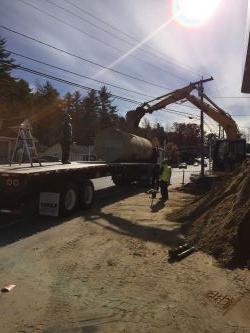Construction Project Assistance Program
A loan and grant program designed to meet present and future drinking water needs in New Hampshire.
 The Construction Project Assistance Program provides loans and grants to projects that build and enhance drinking water infrastructure, improve water quality, increase the viability or longevity of an existing drinking water system, and enable the State to meet present and future drinking water needs.
The Construction Project Assistance Program provides loans and grants to projects that build and enhance drinking water infrastructure, improve water quality, increase the viability or longevity of an existing drinking water system, and enable the State to meet present and future drinking water needs.
Projects that involve the design, assembly, building, acquisition, alteration, remodeling, improvement, or extension of components of an existing or new water system to meet these objectives may apply:
- Address drinking water contamination.
- Expand existing or create new community water systems to serve an existing water supply need or anticipated future need.
- Rehabilitation of drinking water reservoir dams.
- Construction, expansion or rehabilitation of monitoring well systems at well fields.
- Any construction project eligible under the Drinking Water State Revolving Fund program.
- Any other construction project fulfilling the requirements of RSA 485‐F:4, VII(a).
For more details on project eligibility, please see the Advisory Commission’s rules.
Who may apply?
- A State agency, board, or commission or any political subdivision of the State.
- Any person or legal entity that owns a community water system or water distribution system.
- A nonprofit organization that owns a non‐transient, non‐community water system, such as a school.
- Other entities approved by the Advisory Commission consistent with RSA 485‐F.
Funding priorities
The Advisory Commission established key priorities to focus funding for the program's 2023 Annual Round. Projects that met one or more of the Core Criteria listed below were considered more competitive for funding.
- Project results in the removal, reduction, or mitigation of contamination related to groundwater or drinking water defined as a documented exceedance of a regulated drinking water Maximum Contaminant Level and/or water quality standards.
- Project will result in the interconnection or consolidation of two or more public water systems (PWSs).
- Project has regional significance by expanding an existing or creating a new community water system to address current or future supply needs or extend to areas impacted by contamination.
- Project promotes economic development and/or workforce housing for the state by improving water system accessibility and/or increasing capacity to areas without access to a PWS.
Other criteria considered
- The PWS serves customers with a low Median Household Income (defined as less than the state MHI of $83,449 using the 2017 – 2021 American Community Survey data,) or high Affordability Index (water rates/MHI is greater than 1.5).
- Proposal prioritizes a DWGTF loan request over a DWGTF grant request.
- The project will address an infrastructure deficiency documented by the New Hampshire Department of Environmental Services that requires infrastructure improvements to meet compliance.
- Project has long-term viability and is consistent with the applicant’s established Asset Management Program and proposed management of assets, Capital Improvement Plans, and rate analysis associated with the project.
- Project is energy efficient or increases energy efficiency of the system.
- Project improves water efficiency.
- Project involves a unique or innovative approach that enhances public health, cost savings and/or improve the reliability of safe drinking water.
Project readiness and leveraged funds
Applicants who show proof they can successfully execute the project and have a well-developed workplan to complete the project in a timely manner will be prioritized for funding.
A goal of the Advisory Commission is to sustain the longevity of the DWGTF by leveraging outside funds to the greatest extent possible. This may be investment from the applicants’ own funds, private developer contribution, and/or loans or grants from other grant and loan programs. Applicants that demonstrate they have exhausted all applicable outside funding sources outlined in section 8 of the funding application will be more highly considered for funding.
The Advisory Commission solicits funding applications in the fall of each year (typically October). Each application is reviewed for completeness, and if found eligible, applicants are invited to submit a final application to receive funding.
Resources
What are the benefits of a DWGTF loan?
What are the benefits of a DWGTF loan?
The Trust Fund offers below-market loan rates with no closing costs, no origination fees and no prepayment penalties. Disbursement requests can be made as project costs are incurred, and interest on disbursements is only 1% until the project reaches substantial completion. Loan repayments do not begin until up to one year after substantial completion. NHDES staff assistance is available through every step of your project. This includes project planning and administration, design review, environmental review, and construction and compliance oversight.
I'm approved for funding, now what?
Once approved for funding, a final application must be submitted for the agreement to be approved by the New Hampshire Governor and Council. We provide a detailed list of process steps and required documents for the final application for guidance.



